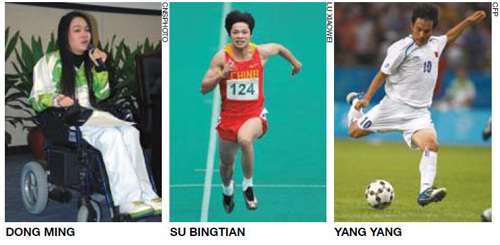|

On August 17, Su Bingtian, a student of Guangzhou-based Jinan University, earned a bronze medal at the men's 100-meter race. It was the first athletics medal for the Chinese delegation at the Shenzhen games.
"I never expected to win the bronze," said Su. "It's my first time participating in this competition, and I'm really happy to win glory for China."
Su has been called "the new flying man of Asia" after clinching the 100-meter title at July's Asian Athletics Championships in Kobe, Japan in 10.21 seconds. He also won a team gold at the 4×100-meter relay race at the Guangzhou Asiad last November.
"After the games, my confidence has become much stronger. I want to break the national record of 10.17 within two years," Su said.
On August 20, Jiang Fan, a student at the Tianjin University of Finance and Economics, won a silver medal in the men's 110-meter hurdles, finishing second to Jamaica's Hansle Parchment in a time of 13.55 seconds.
Jiang took to sports in 2005 because of Liu Xiang. That year, the 10th National games was held in Jiang's hometown Nanjing in east China's Jiangsu Province, which gave him a chance to witness Liu's excellent performance. After seeing his idol in person he decided to devote himself to the sport.
Even after his success, however, Jiang refuses to be compared with Liu.
"I don't want to be the second Liu Xiang. I want to be myself. I will continue to improve in this event," said the 22-year-old Jiang.
Jiang is scheduled to compete alongside Liu at the upcoming world athletics championships in Daegu, South Korea.
"I'm longing to compete with my idol and to show the strength of Chinese youth in the games," Jiang said.
Making a contribution
Like any major sporting event the Universiade is not only about the athletes, but also about the supporters and volunteers who bring life to the games.
Li Jianqiang, who took the Universiade flag around the country on a backpacking tour, is a typical example.
In January 2007, Li, also known as "Brother Strong," shot a picture of the moment Shenzhen won the bid to hold the 2011 Universiade. Since then he diligently recorded the construction of the games' venues.
He also organized a campaign promoting the games at more than 100 universities across the country.
"I hope more people will learn about the games and make their own contribution," he said.
Li started promoting the Universiade in 2009 when he founded the Longgang District Mountain Climbing Association.
He organized a climb at Ma On Shan in Hong Kong, which attracted more than 100 mountain-climbing enthusiasts from Guangzhou, Shenzhen and Hong Kong in April 2010. The climbing team took the flag of the Universiade and promoted the games among Hong Kong residents.
In October 2010, Li and 15 other volunteers initiated a driving tour to promote the games. They traveled along the Qinghai-Tibet Highway and covered over 10,000 km.
During the 17-day driving tour they visited five universities in southwest China to collect college students' signatures. Li said they had spread the word about the 2011 Universiade at universities where many students hadn't previously heard of the games.
The wheelchair-bound Dong Ming is another charismatic figure making a contribution to the Universiade.
The 25-year-old girl from central China's Hubei Province was one of 26,000 volunteers at the Universiade, "I'm involved in the media service, reception and psychological aid for volunteers," Dong told Xinhua News Agency during a break from her work at the swimming venue. "The Universiade lasts less than two weeks, I really cherish the opportunity of being a volunteer here."
Dong was formerly a competitive diver who was paralyzed in a training accident at the age of 9. She spent the next 10 years of her life lying in bed, unable to even speak, but she finished college courses by correspondence and earned an advanced psychotherapist certificate.
"A qualified volunteer requires not only passion but expertise as well," said Dong. "Psychological aid is my major, and what I am doing here is just to make the best use of that."
An advocate for the rights of the disabled in China, Dong said that sometimes physical disability can turn out to be an advantage.
"Able-bodied volunteers often have difficulty persuading others to obey traffic rules, but when I am on duty on the streets, people pay attention," she said.
Dong has served as a volunteer at a dozen of international events including the 2008 Paralympic Games in Beijing, the 2010 World Expo in Shanghai and the 2010 Asian Games in Guangzhou.
"Being a volunteer is not just a temporary job, it should be a lifetime cause," said Dong, who is dubbed the "smiling angel on the wheelchair" by fellow volunteers.
Of course, it is not just volunteers who make a contribution to the games, hundreds of professionals also play a key role in making any major sporting event happen. Lu Zhongyu, a doctor with the Chinese Universiade Team, is a key factor in the team's success.
As an orthopedic physician at the Beijing Sports University Hospital, Lu has served as team doctor with the Chinese team since the Daegu Universiade in 2003. In the following nine years he has attended five Universiades with the Chinese team.
This time, Lu performed as the team doctor with the Chinese swimming team. In order to keep himself in fit-enough to keep up with his grueling work schedule he had to take train with the athletes.
"Every morning, I swam hundreds of meters in the pool with those young swimmers," said Lu.
"In the pool I feel there is no age difference between those young people and me," the 55-year-old doctor said. And this ability to break down barriers, not just barriers of age but differences in capability, experience, professionalism and amateurism, sums up the spirit of the Universiade. | 